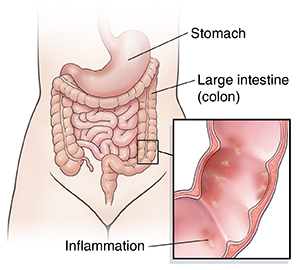Crohn’s disease is inflammation of the intestinal tract that comes and goes in flare-ups. This is a chronic (long-term) illness. During a flare-up, intense abdominal (belly) pain and fever may be felt. Mucus, blood, or pus may appear in the stool. Between flare-ups, inflammation lessens and there usually are no symptoms. Crohn’s disease is a form of inflammatory bowel disease (IBD).
Symptoms of Crohn's disease may include:
-
Abdominal cramps and pain
-
Diarrhea, sometimes bloody, occasionally alternating with constipation
-
Mucus in stools
-
Rectal bleeding
-
Rectal pain
-
Fever
-
Low energy
-
Decreased appetite and weight loss
-
Bloating or swollen abdomen
-
Nausea or vomiting
-
Joint aches
-
Sores in mouth
-
Red, painful eye problems
-
Rashes in anal area or other anal problems
-
Abscess (infection) or fistula (abnormal opening in the digestive tract)
No one knows exactly what causes Crohn's disease, and there is no cure. The goal of treatment is to control and relieve symptoms and prevent complications, so you can lead a full and active life. No single treatment works for everyone, but many things can be done to help.
Diet
Foods did not cause your Crohn's disease. But they can affect it. Unfortunately, there is no one diet that works for everyone. Keep a food log to figure out what you are sensitive to. Below are some things to try.
-
Eat more slowly and smaller amounts at a time, but more often. Remember, you can always eat more if you are still hungry. But you can’t eat less once you’ve eaten too much.
-
High fiber foods are complicated. While they may help constipation and diarrhea, they can make the bloating, cramping, and gas worse.
-
If your Crohn's disease involves the small intestine, staying away from lactose-containing dairy products can help relieve some symptoms.
-
Try limiting spicy or fatty foods. Consume lean protein meats, such as fish and poultry.
-
Eat less sugar.
-
Bloating or passing excess gas may be controlled. Stay away from "gassy" foods, such as beans, cabbage, broccoli, and cauliflower.
-
Stay away from certain types of fruits and fruit juices, such as pear, peach, and prune.
-
Caffeine, alcohol, and stimulants may make symptoms worse. These include coffee, tea, sodas, energy drinks, and chocolate.
Lifestyle
Although stress does not cause Crohn's, it's often a factor in flare-ups. It can also affect how you feel about and cope with your health problem.
-
Look for things that seem to make your symptoms worse, such as stress and emotions.
-
Counseling can often help relieve stress. So can self-help measures, such as exercise, yoga, and meditation.
-
Depression can be a part of this illness and antidepressants may be prescribed. This may actually help with diarrhea, constipation, and cramping, as well as depression.
-
Smoking doesn't cause Crohn's. But it can make the symptoms worse. It can also make the disease more severe and harder to control. It's very important to stop smoking if you have Crohn's disease.
Medicines
Your healthcare provider may prescribe medicines. If so, take them as directed. In Crohn's disease, long-term medicine is usually needed. This is because control of the disease is very important to prevent complications in the future. Control is called remission. The goal of treatment is remission. Complications can include continued inflammation, a blockage (obstruction), a communication between different organs (a fistula), a pocket of pus (abscess), and anal problems. This is why it's very important to follow your treatment plan carefully. For acute flare-ups, prescription medicine can be prescribed. Call your healthcare provider if you need this.
-
Ask your healthcare provider before taking any antidiarrheal medicines.
-
Medicines to control Crohn's disease include pills, intravenous infusions, and injections. Your healthcare provider can discuss the pros and cons of different medicines with you.
-
Don’t take anti-inflammatory medicines like ibuprofen or naproxen.
-
Consider nutritional supplements. This is especially true if the diarrhea is prolonged, or you aren't eating or are losing weight.
If you need supplements, talk it over with your healthcare provider for the best recommendation. Stay away from herbal supplements. They are not evaluated by the FDA. Because of this, there is no way to be certain of their safety and purity.
Follow-up care
Follow up with your healthcare provider, or as advised. If a stool sample was taken or cultures were done, you will be advised if your treatment plan needs to change. You may also need blood tests, procedures, or imaging studies. Call as directed for the results.
Support
Joining a support group for people with Crohn’s disease can be a source of useful information on how others are coping with this illness. They are available in person, on the phone, or on the Web. Contact the following resources for more information:
-
Crohn’s and Colitis Foundation of America, Inc., 800-932-2423, www.ccfa.org
-
National Digestive Diseases Information Clearinghouse (NDDIC), www.digestive.niddk.nih.gov
When to get medical advice
Call your healthcare provider right away if any of the following occur:
-
Fever of 100.4ºF (38ºC) or higher, or as directed by your healthcare provider
-
Abdominal (belly) pain that doesn't get better when you take the usual measures
-
Mucus, pus, or small amounts of blood in the stool (dark or bright red)
-
Repeated vomiting
-
Abdominal swelling and pain that doesn’t go away after a few hours
Call 911
Call
-
Trouble breathing
-
Confusion
-
Extreme sleepiness or trouble waking up
-
Fainting or loss of consciousness
-
Rapid heart rate
-
Large amount of blood in the stool (dark or bright red)
Featured in


